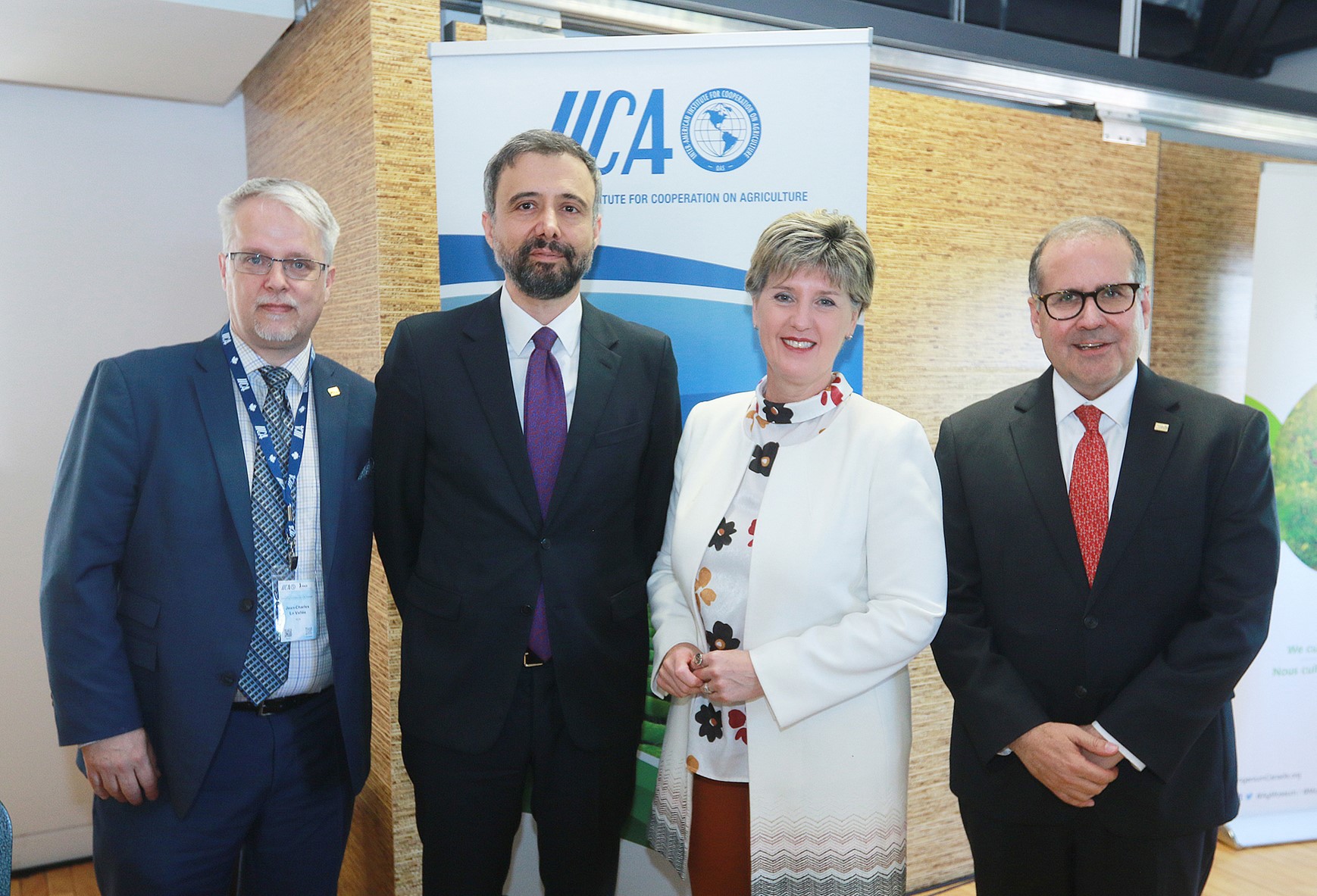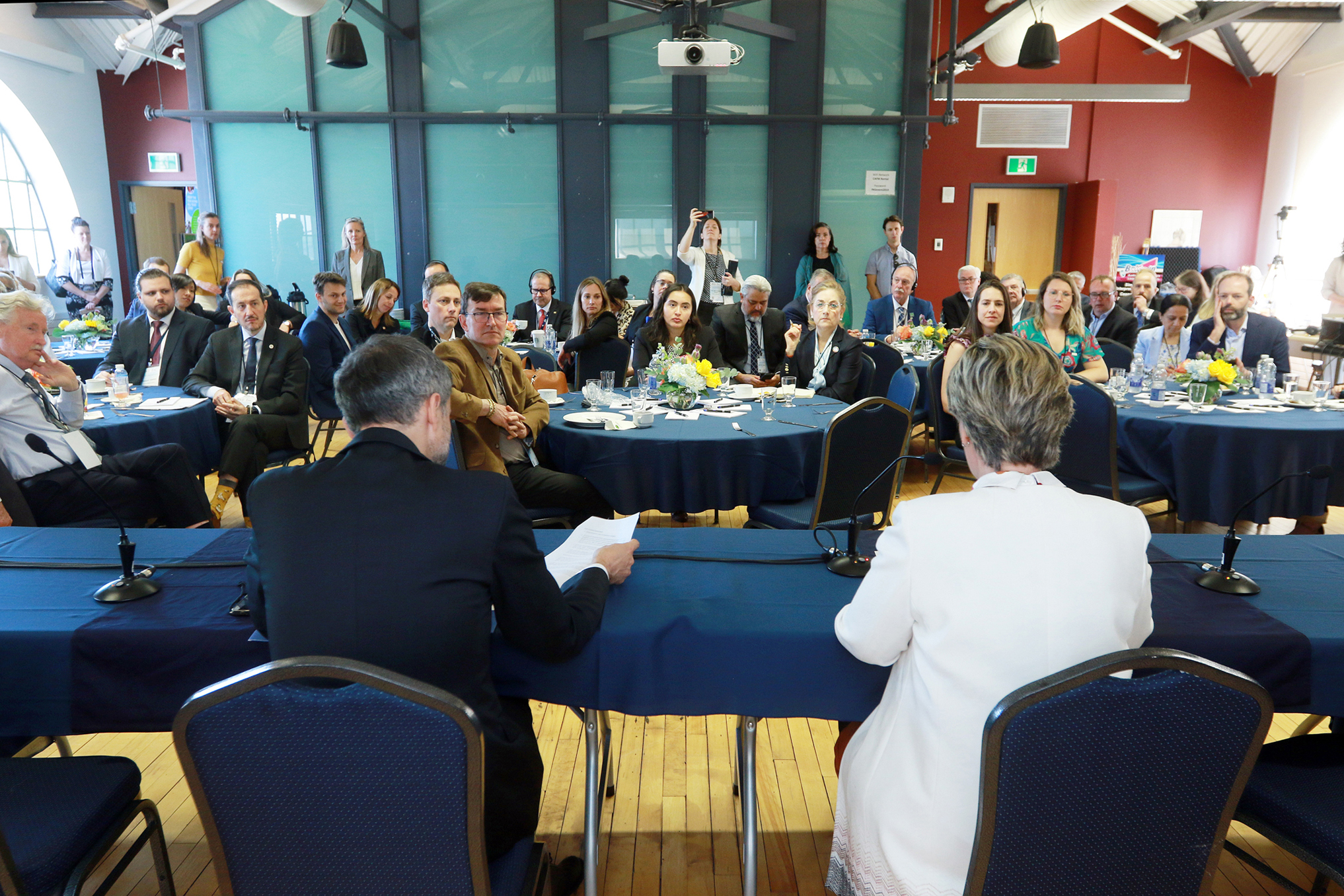The Inter-American Institute for Cooperation on Agriculture (IICA) and the International Fund for Agricultural Development (IFAD) jointly organized the IICA-IFAD Hybrid Workshop on Confronting Food Insecurity in the Americas, held on May 30 at the Canada Agriculture and Food Museum (CAFM) in Ottawa.
The event was attended by more than 50 distinguished guests, including experts, policymakers, and stakeholders, with the special participation of the Minister of Agriculture and Agri-Food Canada, the Honourable Marie-Claude Bibeau, the President of IFAD, Dr. Álvaro Lario, and the Deputy Director General of IICA, Mr. Lloyd Day.
After opening remarks by Dr. Jean-Charles Le Vallée, representative of IICA Canada, and Kerry-Leigh Burchill, Director of CAFM, the guests welcomed Minister Bibeau and Dr. Lario, who offered the first speeches of the conference.
Although this was not the first time the two had met, it was the first time they had shared such a close space. Smiling and expressing mutual admiration, they both used this occasion to emphasize the challenge of food insecurity in the Americas and the urgency of working together from different sectors to confront it.
|
“Minister Bibeau highlighted Canada's strong commitment to addressing the problems of hunger and food security around the world.” |
During her remarks, Minister Bibeau pointed out some of the key aspects of the food security issue, such as the importance of innovation and technology in addressing the challenges faced by farmers, Canada's history of agricultural advancements, and the need to continue investing in research and development for sustainable practices.
The Minister once again demonstrated her commitment to women, recognizing their vulnerability to food insecurity and the need to provide them with training. Investing in women, she noted, not only promotes gender equality but also strengthens food security and sustainable agriculture.
She also referred to Canada's international commitments, among which she highlighted specific projects in Colombia and Nicaragua to improve nutrition and empower smallholder farmers. Speaking in English, French, and Spanish, the Minister emphasized Canada's strong commitment to facing the problems of hunger and food security worldwide.
The Minister's speech was followed by that of Dr. Álvaro Lario, President of IFAD.
|
“Dr. Lario recognized the urgency of supporting family farmers and promoting sustainable and resilient agricultural practices.” |
Dr. Lario leads IFAD's efforts to reduce poverty and food insecurity around the world and, during his participation, brought up key issues in this fight, such as the crucial role of family farming in achieving global food security, the need for transformative changes in food systems, and the importance of addressing the challenges faced by smallholder farmers to integrate them into value chains.
For Dr. Lario, collaboration between farmer organizations, cooperatives, and stakeholders is necessary. To this end, IFAD can be a reliable intermediary to facilitate collaborative approaches. At the same time, he pointed out the importance of always evaluating the impact of the interventions carried out to measure their effectiveness and ensure that they do contribute to improving people's lives. In closing, and in line with Minister Bibeau's speech, Dr. Lario recognized the urgency of supporting family farmers and promoting sustainable and resilient agricultural practices.

(L-R) Dr. Jean Charles Le Vallée, IICA Canada Representative; Dr. Álvaro Lario, president of IFAD; Hon. Marie-Claude Bibeau, Minister of Agriculture And Agri-Food in Canada, and Mr. Lloyd Day, DDG of IICA.
Following insightful contributions by the Minister of Agriculture and the President of IFAD, the keynote session closed with the participation of Mr. Lloyd Day, Deputy Director General of IICA.
In a dynamic presentation full of information that pleasantly surprised the audience, Mr. Day emphasized key aspects for promoting sustainable agriculture and food systems in Latin America and the Caribbean: investment, collaboration, and the inclusion of farmers. For Mr. Day, it is necessary to include farmers in discussions and decision-making processes, recognizing their invaluable perspectives and knowledge.
In his speech, the Deputy Director General of IICA underscored the importance of collaboration and cooperation between countries and organizations, a fundamental practice in IICA's constant efforts to promote inclusive approaches.

(L-R) Dr. Álvaro Lario, president of IFAD; Hon. Marie-Claude Bibeau, Minister of Agriculture And Agri-Food in Canada
After the fruitful keynote speeches and a networking break among the guests, the conference continued with a panel discussion moderated by Dr. Jean Charles Le Vallée, with the participation of Ron Hartman, Director for Global Engagement, Partnerships, and Resource Mobilization at IFAD, Santiago Alba Corral, Climate-Resilient Food Systems Program Director at the International Development Research Center (IDRC), Magali Delomier, Deputy Executive Director of l'Union des producteurs agricoles (UPA), and Keith Currie, President of the Canadian Federation of Agriculture (CFA).
|
“Experts present at the workshop agreed that incorporating traditional knowledge systems and ensuring gender equality in the agricultural sector contributes to more resilient and inclusive food systems.” |
The common denominator of this panel was the promotion of sustainable livelihoods in family farming, a topic on which each panelist brought different perspectives that enriched a productive discussion.
Hartman underscored IFAD's interest in supporting smallholder farmers around the world and emphasized the importance of capacity building, knowledge sharing, and gender considerations in fostering sustainable livelihoods for farmers.
In turn, Corral underlined the importance of integrating indigenous knowledge and gender considerations into agricultural research and called for broader social transformation in response to the urgent global need to combat the climate crisis and inequalities.
Demolier spoke about the resilience of family farming in the face of environmental, political, and social challenges, particularly climate change, and stressed the need for farm-level research and involving farmers in finding sustainable solutions.
Finally, Currie offered a view from the Canadian perspective, highlighting the diversity of agriculture and the importance of adopting tailored sustainable practices, healthy soils, evidence-based decision-making, and collaboration with natural resource ministries.
This first round of contributions by the panelists opened an interesting debate with the public and led to an enlightening exchange of ideas and considerations on the current food security situation in the Americas.
Some themes on which both panelists and guests agreed were the importance of collaboration between governments, international organizations, and stakeholders and the need to develop inclusive policies and encourage the creation of partnerships that actively involve small farmers, indigenous communities, and other stakeholders. Importantly, indigenous knowledge and gender considerations were identified as vital elements in the development of sustainable agricultural practices.
Experts present at the workshop agreed that incorporating traditional knowledge systems and ensuring gender equality in the agricultural sector contributes to more resilient and inclusive food systems. Holistic approaches that consider economic, social, and environmental dimensions were also a common thread in the conference discussion, as through integrating diverse perspectives and addressing challenges holistically, sustainable livelihoods for family farmers can be fostered, leading to resilient and climate-smart food systems.
|
“Continued investment in research, technology, and training, along with active stakeholder engagement, will be crucial to ensuring sustainable and equitable food security in the region.” |
Overall, the workshop provided valuable insights into the challenges and opportunities for confronting food insecurity in the Americas. Collaboration, innovation, and inclusive approaches were identified as key drivers for building climate-resilient food systems and empowering smallholder farmers. Continued investment in research, technology, and training, along with active stakeholder engagement, will be crucial to ensuring sustainable and equitable food security in the region.
Not often has Canada had the opportunity to bring together such a select group of stakeholders on the issue of food insecurity in the Americas. The event, praised by attendees and speakers, has laid the foundation for future opportunities, such as knowledge sharing, holistic approaches, and evidence-based decision-making, to further advance the cause of sustainable family farming and confront food insecurity in the Americas.
For those who were unable to attend the workshop virtually or who would like to listen to the interesting discussions again, the recording of the event (with live interpretation in English, Spanish, and French) is now available on IICA’s Canada YouTube channel.

Vivian Argüelles is a passionate veterinarian dedicated to promoting integration and sustainability of agriculture and livestock systems. She holds a Veterinary Medicine degree from the National Autonomous University of Mexico and is currently pursuing a Ph.D. at McGill University, where she conducts research on sustainable transition pathways in the Mexican beef sector. Since 2022, Vivian is also a valued collaborator at IICA, where she provides technical advice and participates in projects related to animal health, sustainable livestock practices and development of agritourism initiatives.
The opinions expressed in this article are the responsibility of the author and do not necessarily reflect the opinion of IICA.
|
If you have questions or suggestions for improving the BlogIICA, please write to the editors: Joaquín Arias and Eugenia Salazar. |
Add new comment